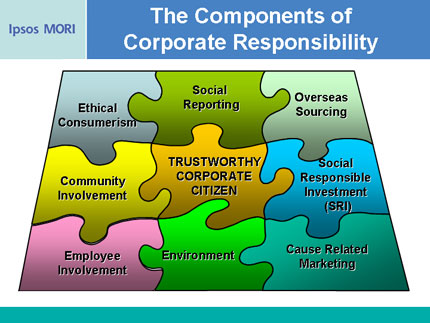Corporate Responsibility
I'm on a mission; abolish the phrase "corporate social responsibility". And replace it with "corporate responsibility". Will you help me?
Several years ago I was in the lobby of the House of Commons, with a few minutes between meeting a new Foreign Office Minister and dinner with a member of the Cabinet, and was using the time to read some papers in my briefcase. Suddenly Nigel Griffiths, now Deputy Leader of the House, spotted me, and came over for a chat. He'd just been brought back into Government then, as Minister for Corporate Social Responsibility.
After offering my congratulations, I said I wanted to abolish his title, because I so strongly believe that in this day and age (sorry for the clichй Dr Foster!), explaining that it is my thesis that no modern corporation can exist for long, much less thrive, without taking responsibility for its actions beyond the traditional responsibilities to obey the laws of the land and adding value (another clichй these days) to its shareholder.
This came home to me many years ago in a meeting at Tesco, when I challenged the board members to whom I was reporting research findings to tell me, systematically and objectively, which of the many publics Tesco dealt with were crucial to the future success of their business. They were unanimous: local government planning officers and council members on planning committees. Not their shareholders, customers, or their workforce, although they were quick to acknowledge their obligations to pay due respect to these important stakeholders, but the people who limited the growth and ambitions of the new broom sweeping through what has now become a world-class major corporation.
Several years ago one of my colleagues came up with what I thought a brilliant visual image that graphically described the interrelationship of some, if not all for all companies, stakeholders for today's modern corporation.

Every company has different sets of stakeholders, most if not all need to worry about their funders, owners and lenders, who fuel growth; customers, for most, even internal customers within the company, and this applies to governments and NGOs as well, for as we broaden our definition beyond those buying products and services to think of the consumers of what we produce; employees, important to the sole proprietor as well as the chairman of a large company; and others.
The mix differs, and it's not enough to respond, as so many corporate executives and their advertising and pr advisors do that after shareholders, customers and employees they suggest "opinion formers", and think that the identification of who are the publics of importance to your company stops there. It doesn't. To guide focus, targeting, budgeting and attention, the loose and I believe useless "opinion formers" must be replaced by clear and precise defining of just who constitutes each level of the organisation's so-called "opinion formers".
So going beyond, and identifying precisely, and regularly, stakeholders is the first stage of managing the modern corporation's reputation, that which has been described by many as the most precious asset that you have. It becomes an increasingly difficult and challenging job the more complex the organization.
In a recent consulting assignment with an international trade association, working with the association's executives, and their pr advisor, which operates from a continental base and incorporates regional associations, offices in a number of individual countries, and is funded by and works of behalf of a number of major international corporations, they found more than 200 stakeholders ranging from a few important to all levels of the association and the companies, e.g. those within the companies and association such as the top management and sales force personnel in touch with many of the other stakeholders who they wish to influence.
It's not an easy job, but it is an important one, and one that should be thorough, consultative, and repeated regularly; I'd advise revision annually. Good luck.



